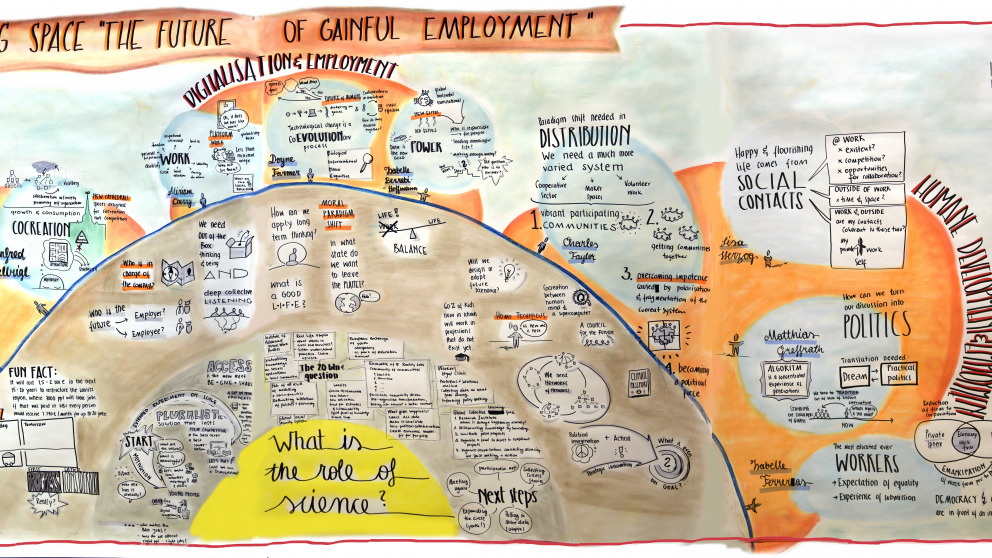Intelligent Robots, Sustainability, and the Crisis of Democracy: What Kind of Working World Will the Future Bring?
15.12.2017
Digitalisation and globalisation are fundamentally changing the way we work. The development of artificial intelligence might even render our capacity to think obsolete, dramatically recasting the future of humanity. What role should the state and the market play in these developments? How can we ensure that technological progress benefits humankind? And what consequences could be expected from the abolition of gainful employment? Questions like these dominated discussions among international experts at the “Thinking Space on the Future of Gainful Employment” held at the IASS on 30 November and 1 December.

Radical or gradual change?
“The huge structural changes that we are facing call for a reappraisal of the nature and organisation of work across the globe. They are also of great relevance for the UN sustainable development goals, especially goal 8, which refers to decent work for all. With the Thinking Space, we wanted to explore not only the normative foundations of sustainability and a good life, but also concrete cases such as the structural transformation of former coal-mining regions, which is presenting their inhabitants with major challenges,” explained IASS Scientific Director Patrizia Nanz, who convened the Thinking Space together with Hans-Joachim Schellnhuber, Director of the Potsdam Institute for Climate Impact Research and IASS Senior Advisor. In these regions it is becoming especially clear that in addition to a reorganisation of the working world, we need a revitalisation of democracy at the local level to enable people take questions of their future and identity into their own hands.
Manfred Hellrigl, former head of the Office for Future Questions of the state government in Vorarlberg (Austria) and currently Senior Fellow at the IASS, talked about his experiences of public participation processes and advised: “Instead of just throwing money at problems in regions facing significant watersheds, we need to make people masters of their own destinies and take their ideas on board.” A heated debate arose around the question of the advantages of radical caesura such as a new global economic system without ownership vis-à-vis gradual, small changes to the working world.
Is every job loss regrettable?
As a result of the energy transition, jobs in the fossil energy sector are already being lost, and digitalisation could make entire professions redundant. But for IASS Senior Advisor Hans Joachim Schellnhuber, we shouldn’t shed a tear over every lost job: “Ninety per cent of world’s population work to secure a relatively meagre share of the global economy. Children toil in Manila and other parts of the Global South for a whole week to buy a bottle of Coca Cola. That is not what I’d call ‘decent work’.” In Schellnhuber’s view, the whole system of gainful employment needs to be abolished to make room for the emergence of a new, more sustainable working world.
The participants of the Thinking Space intend to meet again to discuss the future of work with representatives of different age groups and educational backgrounds.
Thinking Space Participants:
Kirsten Dunlop (Climate-KIC), Adrienne Goehler (writer and curator), Manfred Hellrigl (IASS Senior Fellow), Miriam A. Cherry (Saint Louis University), J. Doyne Farmer (University of Oxford), Isabelle Berrebi-Hoffmann (Harvard University), Charles Taylor (McGill University), Lisa Herzog (Bavarian School of Public Policy), Matthias Greffrath (journalist), Isabelle Ferreras (Université Catholique de Louvain), Mark Lawrence (IASS), Patrizia Nanz (IASS), Hans Joachim Schellnhuber (PIK), Frederic Hanusch (IASS).